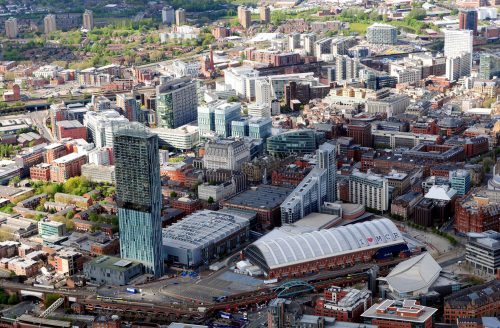Impact of pandemic has ravaged North West city centres

According to a new report published today (January 24), COVID-19 has cost some city and large town centres in the North West more than half a year’s worth of potential takings since March 2020.
The claim is in Cities Outlook 2022 – independent urban policy research think tank Centre for Cities’ annual economic assessment of the UK’s largest urban areas.
Central Manchester is worst affected, losing 41 weeks of sales between the first lockdown and Omicron’s onset. Its loss is the sixth biggest in the country.
The share of vacant commercial units in Manchester city centre has also increased during the pandemic and now stands at 14.6%. This means that more one in 10 stores in the city centre are now sitting empty.
Meanwhile, COVID-19 has cost businesses in Liverpool city centre 26 weeks’ worth of potential takings since March 2020.
The share of vacant commercial units in Liverpool city centre increased and now stands at 11.6%.
Businesses in Wigan and Preston city centres are also among the worst hit.
Burnley’s city centre lost the fewest weeks of sales (eight weeks) in the North West during the pandemic – making it the least affected in the country.
Nationally, COVID-19 has cost businesses in city and large town centres more than a third (35%) of their potential takings since March 2020, with central London, Birmingham, Edinburgh and Cardiff worst affected.
Across the 52 city and town centres studied, 2,426 commercial units have become vacant during the pandemic, against 1,374 between 2018 and 2020.
High streets in economically weaker places have been less impacted by COVID-19. Meanwhile in economically stronger places, business closures increased during the pandemic.
This suggests that the Government’s COVID-19 support successfully stalled the decline of many struggling high streets, but was less effective in economically stronger places due to higher rents and a lack of custom from office workers.
That said, while stronger city centres have borne the economic brunt of the pandemic, their higher levels of affluence mean that, if restrictions end and office workers return, they will likely recover quickly.
Meanwhile, while government support has sheltered weaker places, it may have simply stored up pain for the future. The report warns that many less prosperous places face a wave of new business closures this year.
To avoid permanently levelling down, it has been recommended that North West city centre policy makers should run campaigns to encourage leisure visitors back when safe to do so and provide part-time season tickets to encourage workers back to the office.
Andrew Carter, chief executive of Centre for Cities, said: “While the pandemic has been a tough time for all high streets it has levelled down more prosperous cities and towns. Despite this, the strength of their wider local economies means they are well placed to recover quickly from the past two years.
“The bigger concern is for economically weaker places – primarily in the North and Midlands – where COVID-19 has actually paused their long term decline.”
He added: “To help them avoid a wave of high street closures this year the Government must set out how it plans to increase peoples’ skills and pay to give them the income needed to sustain a thriving high street. Many of these places are in the so-called Red Wall so there is a political imperative for the Government to act fast, as well as an economic one.”







